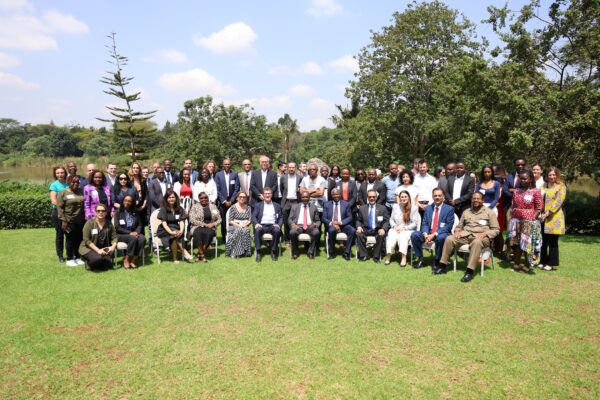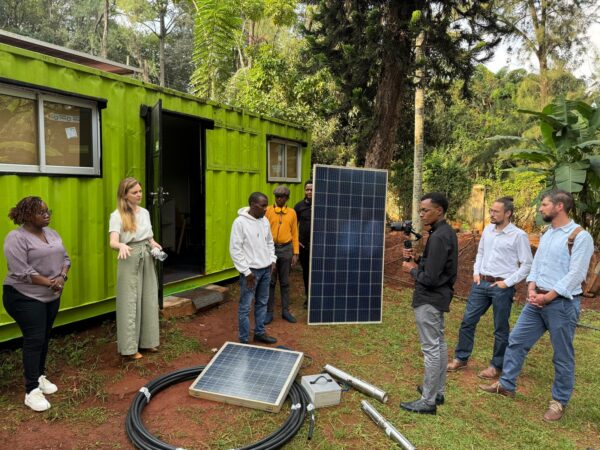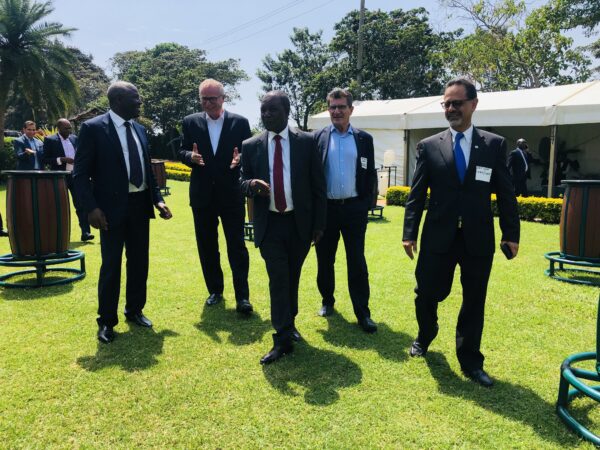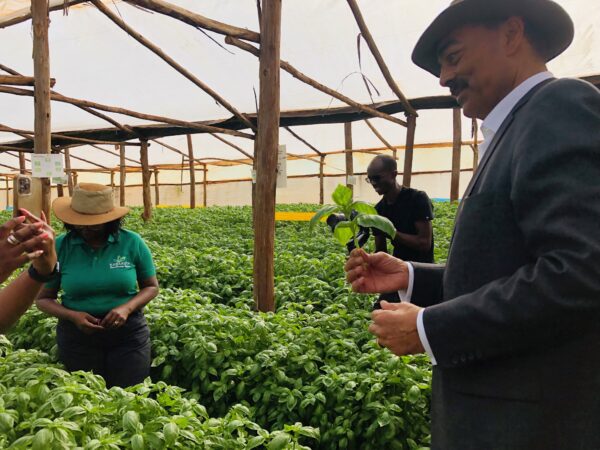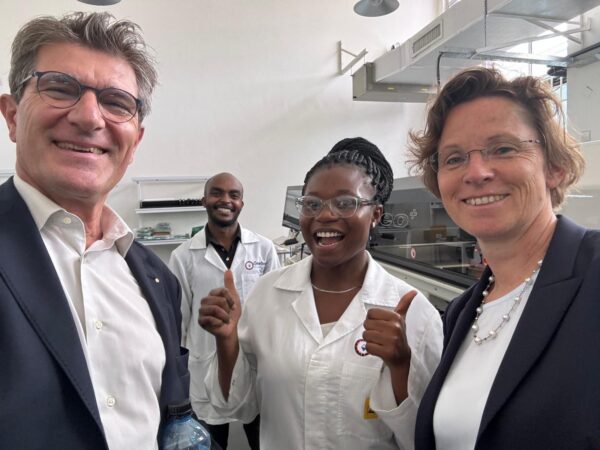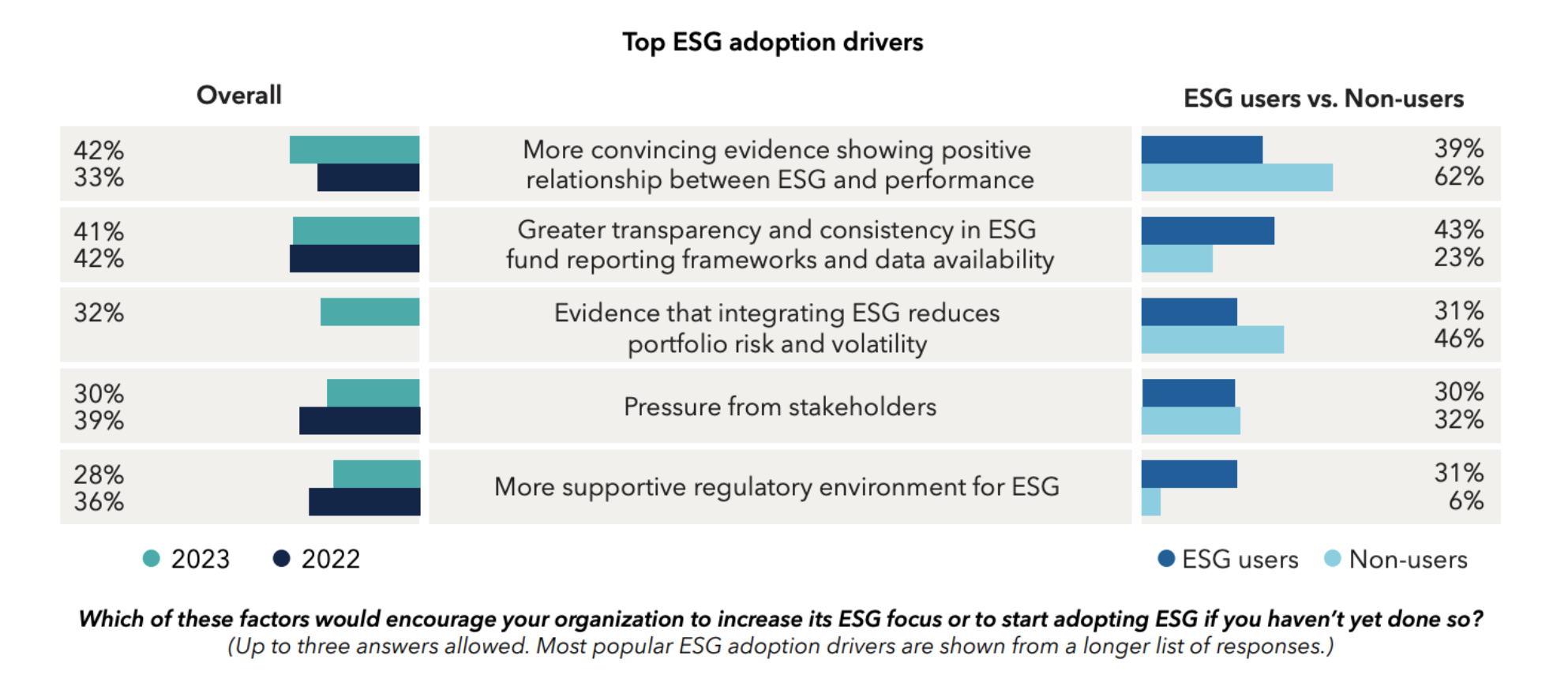On October 31, 2024, we hosted the second session of the “Constructing Change Webinar Series,” part of our lead-up to the Building Bridges 2024, in Geneva this December. This latest session, titled “Where’s the Action? Next Gen Wealth Holders on Overcoming Barriers to Drive Impact” brought together thought leaders and wealth holders to discuss what has been called one of the most significant financial shifts of our time. With an estimated $84 trillion expected to transfer from Baby Boomers to younger generations by 2045, the discussion explored the unprecedented opportunities and challenges that come with this shift.
Barriers to Impact Investing
Dr. Paetzold set the tone by underscoring the urgency of the next generation’s role in addressing global issues such as climate change and social inequality. He presented how the Centre for Sustainable Finance & Private Wealth represents an opportunity to redefine wealth for societal good. Following this, each panelist shared insights on the structural, emotional, and practical challenges they have encountered in their journey to make impactful investments:
Antonis Schwarz, an impact investor known for his work with Good Move Initiatives, discussed the cultural and family-driven pressures that often discourage next-generation wealth holders from engaging in impact-driven investing early in their careers. Benjamin Firmenich, Co-CEO and Head of Impact at Impact Finance, shared his experience launching a fund focused on sustainable agriculture and the need for wealthy individuals to overcome the fear of taking risks with their family’s capital. Katharina Brück, an angel investor with Femventix, brought a personal perspective, recounting how her own journey into impact investing was influenced by a major shift in her identity after inheriting family wealth.
The panelists highlighted several key barriers that next-generation wealth holders often face:
– Family Influence and Generational Gaps: The previous generation’s advisors and family dynamics can limit younger wealth holders’ freedom to make impact-driven investment choices.
– Lack of Financial Knowledge and Fear of Risk: Many inheritors are not equipped with a finance background, leading to insecurity in making investment decisions.
– Social Expectations and Cultural Norms: In certain regions, the expectation to establish professional credibility before utilising inherited wealth can delay entry into impact investing.
Practical Solutions for Impact-Driven Investing
The panel concluded with advice for overcoming these barriers and creating pathways to impactful wealth management. This included seeking out peer networks, connecting with other wealth holders who share the same values can provide next gens with the confidence and knowledge to navigate impact investing. Starting small, but staying committed, allowing them to gain experience and learn from early mistakes without feeling overwhelmed. And lastly, open family dialogue on impact, effective communication with family members about the benefits and returns of impact investing can help bridge generational divides.
Inspiring Action for a Better Future
This webinar highlighted that the great wealth transfer represents not only a shift in assets but also a shift in values. The next generation is increasingly eager to use their wealth as a tool for societal good, signaling a promising evolution in how capital can be deployed for impact. As the panelists showed, next-gen wealth holders are finding ways to overcome barriers and drive meaningful change.
—
Learn more about Building Bridges 2024 >

There is no doubt that the topic of sustainable finance has been an absolute priority in the financial industry for years.
A lot of energy and resources have been invested in greenwashing by industries, regulators and the media. This was the right thing to do: there is no room for greenwashing in the Swiss financial industry.
With the self-regulation of the three industry associations Asset Management Association Switzerland (AMAS), Swiss Bankers Association (SBA) and Swiss Insurance Association (SIA), effective instruments are now in place so that greenwashing should no longer be an issue in the Swiss financial centre. The focus must now return to the central mission of sustainable finance: On impact. The effective climate contribution of self-regulation is ultimately minimal. Climate change is a real problem, and we will not solve it by describing the problem as precisely as possible.
Investment stewardship, for example with high-emission companies, is much more effective: Asset managers are increasingly exerting direct influence on the management of companies in which they are invested through active voting and engagement to make the business model more emission-free. Together with Swiss Sustainable Finance, AMAS has drawn up the Swiss Stewardship Code as a guideline for modern investment stewardship for Swiss financial players.
Given the immense amount of capital required to finance the transformation, this is not enough. However, how private capital can be invested effectively and what role the financial industry, and asset managers in particular, should play in this is sometimes a source of irritating debate.
Anyone who demands that asset managers should simply provide the necessary capital has not understood the financial industry. The corresponding capital belongs to the clients. Asset managers cannot simply dispose of it without violating fundamental liberal principles and property rights.
Asset managers have a fiduciary duty to act in the best interests of their clients and to achieve a return and long-term capital appreciation on the invested capital at an acceptable level of risk. The expectations in sustainable finance are very similar: invested capital can certainly have a positive impact. But here too: The asset management industry can and should offer appropriate investment products, but ultimately it is the customer who decides.
In developing countries in particular, the need for capital for climate protection and sustainability projects is very high. One of the reasons why the flow of capital in this direction is stagnating is that the investment risks associated with such projects are difficult to assess and there is a lack of suitable investment vehicles. ‘Blended finance’ can play a key role here: State and private investors jointly finance such a project but invest in different tranches with different risks and expected returns. If the state is the first to assume any defaults and is compensated accordingly, a project becomes investable for a wide range of parties and private capital can be made available on a much larger scale. Asset managers can play an important role here – provided the framework conditions are right and sufficiently large investment volumes are available.
– Author: Adrian Schatzmann
– This contribution is brought to you by Asset Management Association Switzerland (AMAS), a valued founding partner & event partner of Building Bridges 2024.
With many of the United Nation’s Sustainable Development Goal (SDG) targets still lagging and a growing funding gap, the need to innovate to amplify positive impact has never been more urgent. Artificial intelligence (AI) offers a promising tool for accelerating progress by enhancing data analysis, knowledge access and operational efficiency. We believe that alliances and opportunities for strategic collaboration can turbocharge the potential of AI to bring about truly inclusive development.
Stronger together
SDG 17 emphasizes the importance of multi-stakeholder partnerships as a means to accelerate progress across all SDGs. By pooling resources, sharing knowledge and expertise, and increasing access to technology for all, actors in global development can support more individuals and empower them to drive progress quicker and in a sustained manner.
With its sizable resources and ability to drive technological innovation, including AI, the private sector plays a critical role in this ecosystem. The UN SDG Partnership Guidebook also recognizes that businesses that operate responsibly, inclusively and sustainably have the ability to create and sustain livelihoods, reduce poverty, and deliver essential products and services efficiently and affordably.
But an alliance between the public and private sectors can also be challenging for various reasons, including:
– Differences in priorities and interests
– Lack of concrete plans or policies for implementing AI initiatives
– Lack of awareness around AI solutions and technologies
– Lack of skills for AI in the public sector
– Lack of incentives for engagement
Successful AI alliances
Although these challenges certainly exist, several alliances around AI and the SDGs have already shown that collaboration creates more inclusive outcomes. Examples include:
– ATscale, the Global Partnership for Assistive Technology, is a cross-sector global partnership with a mission to transform people’s lives through AT, including AI-enabled technologies.
– The Global Alliance for Social Entrepreneurship, launched in 2020 by the World Economic Forum and the Schwab Foundation for Social Entrepreneurship, includes an AI for Social Innovation initiative. Here, social innovators and technology leaders come together to leverage AI and other advanced technologies to drive greater impact and innovation in the social sector. The initiative builds on a diverse group of stakeholders with experience in AI and social innovation.
– Founded in 2014, the Digital Impact Alliance (DIAL) is a global coalition committed to advancing positive, sustainable and inclusive digital transformation through collaboration and knowledge sharing. DIAL acts as a convener of governments, funders and other development actors so that development efforts using data and technology promote people’s rights while achieving technological advancements.
Collaboration is key
The role of collaboration among stakeholders should not be overlooked, especially in creating a strong enabling environment that encourages AI-driven innovation while mitigating risks. By forging alliances and promoting strategic partnerships, the full capability of AI for inclusive development can be realized, leading to more equitable and sustainable outcomes
Note: This article was inspired by the report Inclusive Innovation: an inside look at AI’s potential to achieve the Sustainable Development Goals (SDGs), published by EY in collaboration with Devex in September 2024.
– This contribution is brought to you by EY, a valued silver event partner of Building Bridges 2024.
On October 10, 2024, we convened industry experts for the first session of the “Constructing Change Webinar Series,” as part of the lead-up to Building Bridges 2024. This session titled, “Impact Lens Investing – Grabbing the Investor’s Attention?”, attracted both mainstream and impact investors keen to learn how their capital can advance solutions in sustainable agriculture, renewable energy, and circular economy initiatives. Karen Hitschke, CEO of Building Bridges, opened the event, underscoring the role of impact-driven finance in tackling global challenges like climate change and inequality. Kostis Tselenis, Managing Partner of the Swiss Impact Office, took the floor as Moderator to lead a revealing dialogue with four influential voices, investing in impact.
Climate Action and Impact in Focus
The discussion delved into how specific asset classes are advancing sustainable finance goals. Jennifer Boscardin-Ching, who leads thematic equity strategies at Pictet Asset Management, discussed how climate-conscious investments are experiencing growing demand, with public markets now a driving force in climate action. Guillaume Chapuis, Senior Investment Manager at Lombard Odier, highlighted how private equity is innovating within the plastics sector, supporting scalable companies that address carbon reduction and advance circular economy solutions. Both speakers underscored how balancing financial returns with sustainability outcomes is not only feasible but increasingly demanded by the market.
Impact Strategies in Emerging Markets
Sandra Halilovic, Head of H2R Development Facility at Acumen, and Krisztina Tora, Chief Market Development Officer at GSG Impact, expanded the discussion to emerging markets, sharing experiences on deploying impact-first finance. Sandra showcased how Acumen’s initiatives in Sub-Saharan Africa are advancing access to energy through blended finance, a critical tool for mobilising billions in high-need regions. Krisztina noted that building financial ecosystems and fostering collaboration between governments, NGOs, and the private sector is essential to scale impact and address pressing social and environmental challenges.
Key Takeaways: A Practical Guide for Impact Investors
The session closed with clear, actionable insights for mainstream investors looking to embrace impact strategies:
– Impact Doesn’t Mean Lower Returns: Climate-conscious and thematic equity strategies are showing competitive returns, illustrating that impact and profit can go hand in hand.
– Active Ownership Drives Change: Large shareholders can engage with companies to improve sustainability practices, creating lasting positive outcomes.
– Blended Finance Unlocks Emerging Markets: Leveraging blended finance can mobilise large-scale capital to address critical issues like energy access in underserved regions.
– Collaboration Fuels Scale: Partnerships across sectors—government, NGOs, and private investors—are vital for driving systemic impact and broadening financial reach.
What was made evident was that impact investing is no longer a niche pursuit; it’s fast becoming a foundational pillar of the financial system with multiple approaches. From listed equities to private equity, and from the Global North to the Global South, this panel showcased the shift underway in sustainable finance. Impact investing is shaping the future of finance by proving that capital deployed with intention can generate both meaningful outcomes and competitive returns, empowering investors to contribute to a better, more sustainable world.
—
Learn more about Building Bridges 2024 >

DEADLINE EXTENDED: We have extended the deadline for applications to 11 November, 2024. Please note: Volunteers will need official work permits. Whilst we endeavor to support all applications, due to the time required to complete administrative procedures, we encourage late applications from Swiss citizens and permit holders.
Volunteer at Building Bridges 2024
Building Bridges is a week-long sustainable finance conference focused on bringing together diverse stakeholders to accelerate the transition to a sustainable economic system aligned with the vision put forth in the UN Sustainable Development Goals and the Paris Climate Agreement. Our 5th Edition will take place on December 9-12 at CICG in Geneva. It spans a Summit and 3 Action Days with over 65 events on sustainable finance, as well as plenty of opportunities for networking and learning. It is expected to attract over 2,000 attendees from the finance industry, the United Nations, governments, NGOs, academia, and more.
We are seeking a large group of volunteers to support the Building Bridges Summit and Action Days.
WHY VOLUNTEER?
- Learning – Building Bridges will cover the most recent and cutting-edge developments related to sustainability and finance. It is a great opportunity to learn more about this space from leading experts.
- Networking – The initiative is supported by a wide array of partners and all will be in attendance. It is a great way to meet new people whether it be business leaders from financial institutions, social entrepreneurs from developing countries, UN leaders and governmental representatives, NGOs, researchers, and thought leaders. In addition, you will have the opportunity to meet other volunteers who, like you, are motivated by the desire to make a positive impact and accelerate the transition to a more sustainable and equitable financial system.
- Recognition – All volunteers will be recognized in several ways:
-
Each volunteer will receive a certificate and letter recognising their efforts and contributions.
- Opportunity to interact and engage with business leaders from financial institutions, social entrepreneurs from developing countries, UN leaders and governmental representatives, NGOs, researchers, and thought leaders during the event. This engagement will foster valuable connections, knowledge exchange, and networking opportunities.
-
A volunteer page will be featured on our final report summarising Building Bridges 2024.
-
Note: All volunteers are provided with Lunch/ Snacks as per their schedules and allocated tasks during the time of their shifts.
WHAT DO VOLUNTEERS DO?
We have a range of roles for volunteers, they roughly fit into two categories:
- Event-focused activities such as managing the registration and check-in process, providing information, scanning badges, and running the cloakroom.
- Logistics and Management activities such as logistical help to Building Bridges staff, helping attendees with directions, help event organizers with any technical requirements or needs for their events during the week.
Each volunteer will do a mix of these activities depending on their availability and schedule.
HOW DO I SIGN UP?
Any students or other individuals interested in volunteering simply need to fill out this form no later than October 31, 2024. In the form, you will indicate how many days you are willing to volunteer and your availability during the week. This will be used to make you a custom schedule. Any questions about the Building Bridges Volunteer Programme can be directed to community@buildingbridges.org.
Building Bridges took the lead on bringing together for 3 days in Kenya a delegation from private sector leaders from Europe and East Africa to strengthen bridges for sustainable investment. The first Bridging Africa – Europe SDG Investment Summit took place in Nairobi, from June 3 to 5, 2024.
Central to the mission of Building Bridges is the creation of a multi-stakeholder platform, dedicated to channeling capital where it can achieve maximum, sustainable impact. “Only by creating the right conditions to facilitate capital flow can we aim to build an economic system aligned with social and environmental sustainability goals,” said Patrick Odier, Chair of the Building Bridges Foundation. “This initiative embodies our collective will to drive meaningful change.”
The 2024 “Bridging Africa – Europe SDG Investment Summit” in Nairobi builds on a mission to Kenya in April 2023, during which the Building Bridges team engaged with diverse stakeholders, including government officials, development partners, and the private sector.
This inaugural Summit was a collaboration between Building Bridges, the Embassy of Switzerland in Kenya, and the United Nations in Kenya through its SDG Partnership Platform, with support from the Nairobi International Financial Centre and Equity Bank Group. It aimed at forging links and cultivating trust to enable financing and investment pathways among diverse communities, deepening European investors’ and African stakeholders’ understanding of the region’s and the continent’s sustainable investment landscape. And it was a success!
Through site visits, startup pitches, networking sessions and active discussions with financial institutions, government ministries, leading change-makers, high-caliber entrepreneurs and innovators, this pivotal initiative established a strong basis for future collaboration and partnerships. The trip provided the European delegation with an in-depth view of Kenya and East Africa’s advanced sustainability ecosystem, and its promising investment opportunities. Simultaneously, Kenyan local private and public sector representatives, along with tech innovators, showcased their ambitious growth strategies aimed at attracting and sustaining both local and foreign investments in East Africa, a region home to 497 million and to one of the continent’s fastest-growing demographics.
The conversations initiated through this landmark event in Nairobi are a first step into building a proper Africa-Europe bridge and will continue as part of the 5th edition of Building Bridges in Geneva, December 9-12, 2024. Beyond our end of the year flagship event, we will continue building this intercontinental bridge. Stay tuned if you want to join us on this journey or feel free to reach out.
Karen Hitschke, CEO of the Building Bridges Foundation, concludes this 3-day event: “Our objective was to build a strong bridge between our two continents and bring traffic on it. And we succeeded, through a collaborative approach, by connecting and engaging with key local actors, strengthening links and fostering trust among a wide array of communities.”

